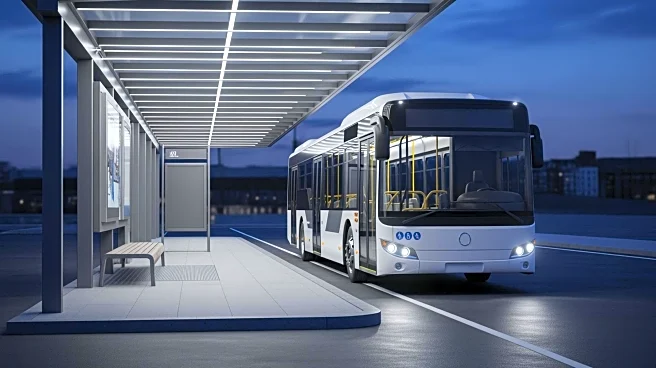What's Happening?
The Department for Transport has announced the extension of a pilot scheme to Hertfordshire, aimed at giving councils more control over local bus services. This initiative involves a franchising model
that allows councils to determine routes, timetables, and fares, with operators bidding to run services for a fixed fee. The government has allocated £360,000 to Hertfordshire County Council for this project. The scheme is expected to enhance punctuality and preserve essential routes, particularly benefiting the 17,000 residents who rely on buses for commuting. The council's executive member for transport, Paul Zukowskyj, expressed enthusiasm for the trial, emphasizing the potential to tailor services to residents' needs. The pilot will initially focus on north Hertfordshire, east Hertfordshire, and Stevenage.
Why It's Important?
This pilot scheme is significant as it represents a shift towards more localized control of public transportation, which could lead to improved service reliability and accessibility. By allowing councils to manage bus services, the initiative aims to ensure that routes remain viable and responsive to community needs, particularly in rural areas where commercial viability is often a challenge. The franchising model could also prevent the discontinuation of socially necessary routes, thereby maintaining essential connectivity for residents. This approach aligns with broader political support for enhancing local authority powers over public transport, as seen in the backing from various political parties.
What's Next?
The pilot project will assess network stability, service frequency, and the integration of existing services like HertsLynx. If successful, the franchising model could be expanded to other regions, potentially influencing national policy on public transportation. Stakeholders, including local governments and transport operators, will likely monitor the outcomes closely to evaluate the feasibility of broader implementation. The initiative may also prompt discussions on funding and resource allocation for public transport improvements across the UK.
Beyond the Headlines
The franchising model could lead to long-term changes in how public transport is managed in the UK, promoting a more sustainable and user-focused approach. It may also encourage other regions to adopt similar models, fostering innovation in public transport solutions. Additionally, the scheme could set a precedent for increased collaboration between local authorities and transport operators, potentially leading to more integrated and efficient public transport networks.









